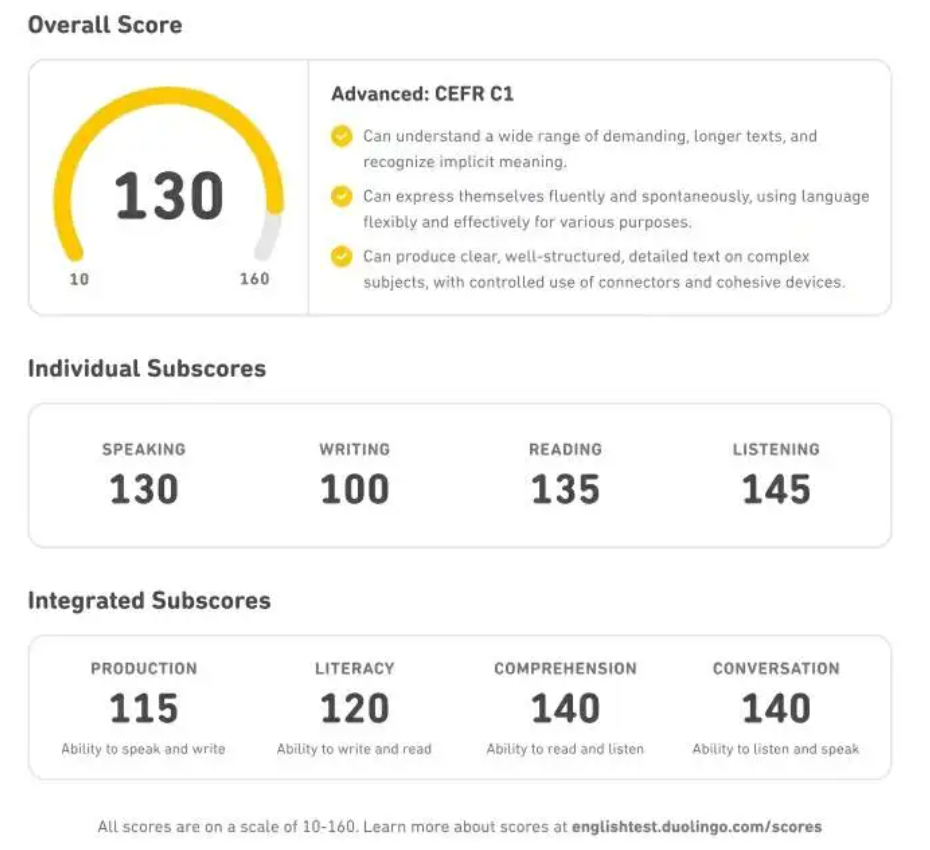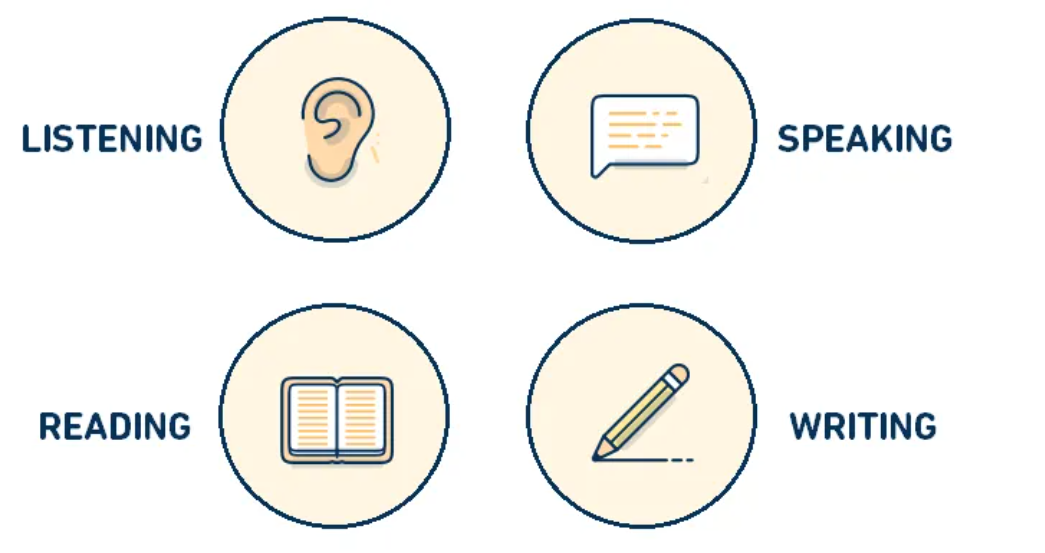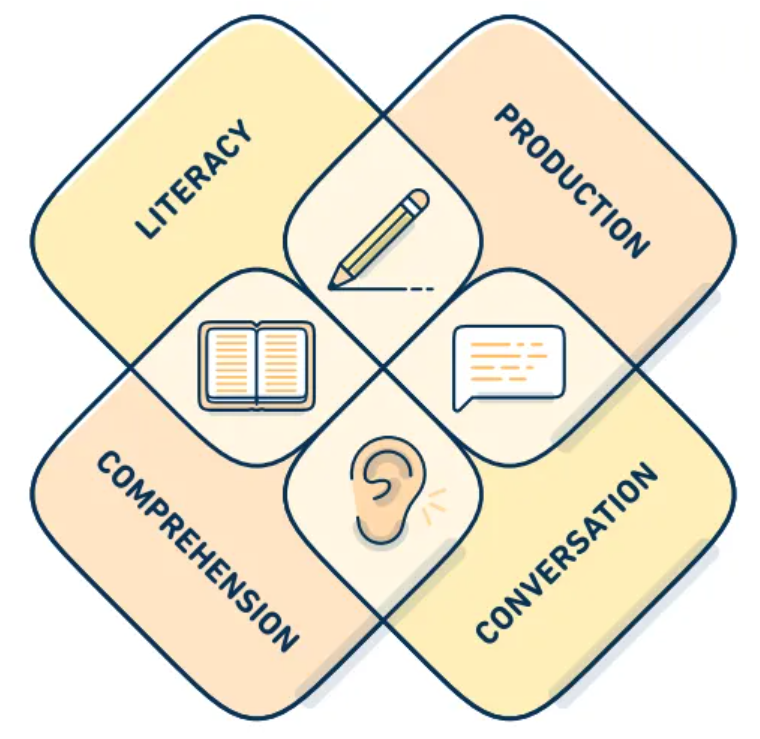Introduction
Duolingo English Test ("DET") is an online English proficiency assessment test for today's international students and institutions. So far, more than 5,000 universities around the world have recognized Duolingo English Test. It takes less than an hour of testing to accurately and objectively assess the candidate's English proficiency from many aspects. Starting from July 1, 2024, the Duolingo English Test (DET) score report will include additional individual skill scores (Listening, Speaking, Reading, Writing) in addition to the composite skill scores (Literacy, Comprehension, Conversation, Production). This article will introduce the overview of Duolingo English Test update, individual subscores, integrated subscores, to help you fully understand the update of Duolingo English Test this time.
Overview
The combination of individual skill scores and composite skill scores will be presented in three dimensions on the score report:
- Overall Score
- Individual Skill Scores: Listening, Speaking, Reading, and Writing
- Composite Skill Scores: Comprehension, Literacy, Conversation, and Production

Overview of Individual Subscores Update

According to the official Duolingo English Test video introduction, the upcoming score report will feature a new section that displays Individual Subscores. This section will detail the candidate’s performance in listening, speaking, reading, and writing, corresponding to these well-known language skills.
Importantly, based on the official explanation: the overall score will be the average of the four new subscores for listening, speaking, reading, and writing, rounded to the nearest whole number:
Overall Score = (Listening + Speaking + Reading + Writing) / 4
a.Listening
This section assesses the candidate’s ability to understand auditory content. Candidates need to listen to and comprehend various types of listening materials, including daily conversations and academic discussions. The score will be based on the candidate’s grasp of key information, details, and implied meanings.
b.Reading
The reading section measures the candidate’s ability to understand written texts. Candidates will read articles of various genres and difficulties, including literary works, scientific reports, professional documents, and popular science papers. The score will be based on the candidate’s understanding of the main ideas, specific details, contextual inferences, and the author’s intent.
c.Speaking
The speaking score reflects the candidate’s fluency and accuracy in communicating in English. Candidates need to answer questions, describe pictures, tell stories, and engage in discussions naturally and confidently. This section also assesses pronunciation, vocabulary use, and the complexity of sentence structures.
d.Writing
The writing score evaluates the candidate’s logic, vocabulary use, and grammatical accuracy in written expression. Candidates need to complete different types of writing tasks according to the standards of academic English writing. The score will be based on the organization of content, coherence, language diversity, and accuracy.
This improvement not only makes the score report more comprehensive but also helps candidates understand their language abilities more clearly. Most importantly, it will change the subscore requirements in future school admission criteria! Starting this September, university admission requirements may likely change due to this reform, reverting to the traditional dimensions of "listening, speaking, reading, and writing," making it easier for schools to set subscore requirements based on IELTS/TOEFL scores.
Overview of Integrated Subscores Update

Institutions that previously did not require subscores might now add subscore requirements for "listening, speaking, reading, and writing," potentially leading to more stringent admission criteria.
Besides individual skill scores, the score report will continue to show the familiar composite scores: Comprehension, Literacy, Conversation, and Production. Among them:
a.Comprehension
This combines listening and reading skills, assessing the candidate’s performance in understanding spoken and written materials. Candidates need to demonstrate their understanding of various information, including main ideas, details, implied meanings, and inferences.
b.Literacy
This combines reading and writing skills, evaluating the candidate’s overall ability in written language. Candidates need to demonstrate their competency in understanding written texts and creating written content, including information processing, content organization, and language use.
c.Conversation
This combines listening and speaking skills, assessing the candidate’s performance in actual communication situations. Candidates need to understand information in conversations and respond appropriately, showing fluent and natural communication ability.
d.Production
This combines speaking and writing skills, assessing the candidate’s ability in both oral and written expression. Candidates need to express their thoughts clearly and coherently, demonstrating good vocabulary use and grammar mastery.
According to the official explanation, composite skill scores are closely related to individual skill scores. Each composite skill score is the average of its corresponding two individual skill scores:
Conversation = (Listening + Speaking) / 2
Comprehension = (Listening + Reading) / 2
Production = (Speaking + Writing) / 2
Literacy = (Writing + Reading) / 2
Currently, as it is the school application season, this reform is unlikely to affect applications before the new academic year, and schools are unlikely to adjust their admission scores based on the new subscores.
However, starting this September, universities accepting Duolingo as an entrance language exam are very likely to adjust their admission policies to include requirements for individual skills in "listening, speaking, reading, and writing."
How will this reform affect your exam preparation? We will provide a detailed analysis after the holiday. After July 1, we will also interpret the exam policies based on real score reports for the candidates!
Additional Resources
By understanding all the new question types, utilizing the provided templates, and practicing with sample questions, you’ll be well-prepared to tackle this new challenge in the Duolingo English Test 2024. Good luck with your exam!
Click here for more DET Preparation Strategies
Start practicing today by signing up for our DET question bank for free.
